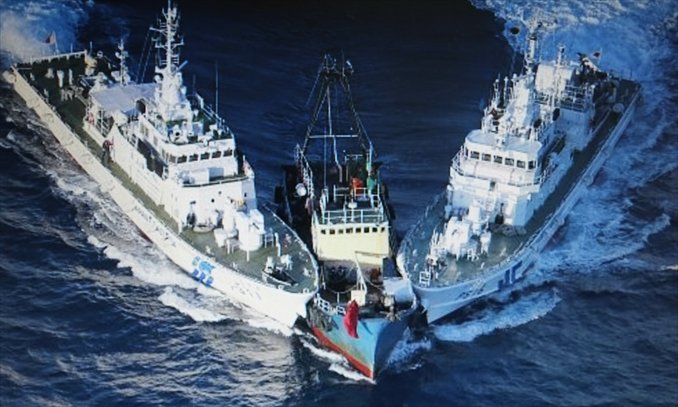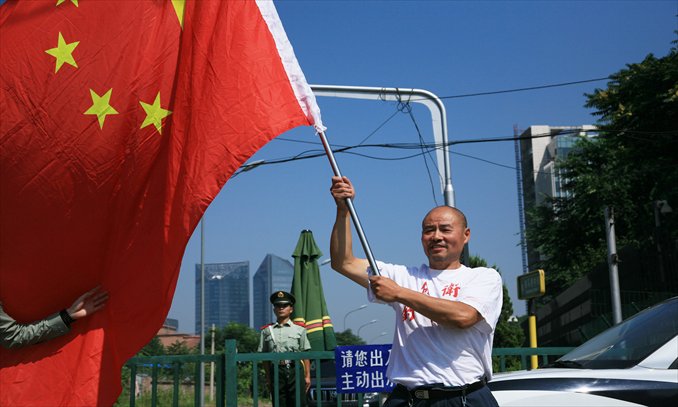Diaoyu activists arrested

Chinese attitudes toward Japan dived to their lowest levels in recent times on Wednesday, after Chinese activists attempting to visit the Diaoyu Islands clashed with the Japanese coast guard on the 67th anniversary of Japan's WWII surrender.
The Japan Coast Guard (JCG) told the Global Times on Wednesday that seven crew members from the Chinese mainland, Hong Kong and Macao landed on the Diaoyu Islands and five of them were taken into police custody on the island, while two others returned to the boat.
The two, along with seven activists on another boat, were all later arrested on suspicions of "illegal entry," the Xinhua News Agency stated, quoting Japan's Okinawa police.
The Chinese Foreign Ministry told Xinhua that China has been in talks with the Japanese side in an attempt to free the Chinese nationals.
Japanese Prime Minister Yoshihiko Noda told reporters that Japan would "deal with the incident strictly in line with the law," according to AFP.
Chief spokesperson for the Japanese government Osamu Fujimura said the Japanese government summoned the Chinese Ambassador to Japan, Cheng Yonghua, to the Foreign Ministry in Tokyo to lodge a protest, Xinhua reported.
The Chinese Ministry of Foreign Affairs said before the landing that China's stance toward the Diaoyu Islands remains consistent and it hopes that the Japanese government won't do anything to harm the crew members or damage their property.
Chinese activists have repeatedly tried to land on the Diaoyu Islands in recent years to assert Chinese sovereignty, but were blocked by Japanese ships in most cases. Seven people were arrested in 2004 after landing on the islands, but were later released.
In support of the landing, dozens of members of the Chinese Civilian Association for Safeguarding the Diaoyu Islands protested outside the Japanese embassy in Beijing Wednesday morning, where they waved national flags and banners while chanting slogans demanding the Japanese government admit that the Diaoyu Islands belong to China. They also delivered a letter to the embassy, addressed to Noda.
"The Japanese have no respect for us and we demand the Japanese return our sovereign territory and admit their killings during World War II," Xie Shaojie, a spokesperson with the mainland branch of the Defending the Diaoyu Islands activist group, told the Global Times.
The protestors stayed until security staff received their letters, which included one for Noda that included a knife to humiliate him for denying history.
The Diaoyu topic became one of the top three of Sina Weibo's most popular discussions with more than 9.1 million posts discussing it by 8pm Wednesday.
"Japan will be isolated from other Asian countries if the Japanese continue to jostle with China over the Diaoyu Islands, as Japan have territorial disputes with other countries including Russia and South Korea," Da Zhigang, a professor of Japanese issues from the Heilongjiang Academy of Social Sciences, told the Global Times.
South Korean President Lee Myung-bak visited the disputed islets called Dokdo in Korean and Takeshima in Japanese, east of Seoul, last week. Lee was the first Korean president to visit the area, Yonhap reported.
Further inflaming Chinese public sentiment is the fact that two Japanese cabinet ministers visited the Yasukuni Shrine on Wednesday, which honors 2.5 million war dead including 14 leading war criminals from World War II, according to AFP.
Teruo Kuno, a director of the Japan-China Friendship Association in Nagoya told the Global Times that the visit by the two ministers to the Yasukuni Shrine represented an effort to exert domestic political pressure.
"The Japanese government intends to double a consumption tax, which is making it lose public credibility. The government wanted to win people over again by visiting the Yasukuni Shrine," Teruo Kuno said.
However, he said Japanese who are younger than 40 years old are not interested in the political theater involved in visiting the shrine, and that the Japanese government might lose credibility and bring damage to Sino-Japanese relations.
"Currently, both nations have close economic ties, but mutual trust at both the government and the public level remains weak," Da said.
South Korean President Lee Myung-bak Wednesday demanded the Japanese emperor, who reportedly is willing to visit South Korea, sincerely apologize for those who died fighting for the independence of Korea, otherwise he is not welcome, Xinhua reported.
According to ifeng.com, the World Chinese Alliance in Defense of the Diaoyu Islands said it will launch protests in several cities on Thursday, and would send more activist boats to the Diaoyu Islands.
